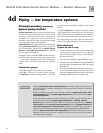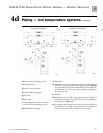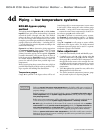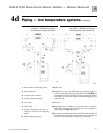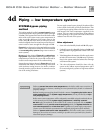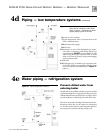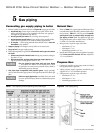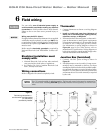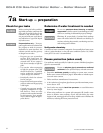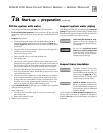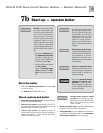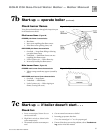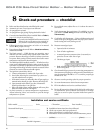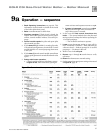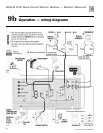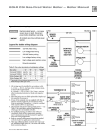
GOLD CGi Gas-Fired Water Boiler — Boiler Manual
32
Part Number 550-110-710/0107
Start-up — preparation7a
Check for gas leaks
Before starting the boiler, and dur-
ing initial operation, smell near the
floor and around the boiler for gas
odorant or any unusual odor. Do
not proceed with start-up if there is
any indication of a gas leak. Repair
any leak at once.
Propane boilers only — Your pro-
pane supplier mixes an odorant with
the propane to make its presence
detectable. In some instances, the
odorant can fade and the gas may
no longer have an odor.
• Propane gas can accumulate
at floor level. Smell near the
floor for the gas odorant or any
unusual odor. If you suspect a
leak, do not attempt to light the
pilot.
• Use caution when attempting
to light the propane pilot. This
should be done by a qualified
service technician, particularly
if pilot outages are common.
• Periodically check the odorant
level of your gas.
• Inspect boiler and system at least
yearly to make sure all gas piping
is leak-tight.
• Consult your propane supplier
regarding installation of a gas
leak detector. There are some
products on the market intended
for this purpose. Your supplier
may be able to suggest an appro
-
priate device.
Determine if water treatment is needed
Do not use petroleum-based cleaning or sealing
compounds in boiler system. Severe damage to boiler
will occur, resulting in substantial property damage.
Eliminate all system leaks. Continual fresh makeup
water will reduce boiler life. Minerals can build up in
sections, reducing heat transfer, overheating cast iron,
and causing section failure.
Verify water chemistry
Consult local water treatment companies for unusually hard water areas
(above 7 grains hardness) or low pH water conditions (below 7.0). Boiler
water pH of 7.0 to 8.5 is recommended.
Freeze protection (when used)
Use antifreeze made especially for hydronic systems. Inhibited propylene
glycol is recommended.
Do not use ethylene glycol, automotive or undiluted
antifreeze. Severe personal injury or death can result.
1. Determine
antifreeze quantity according to system water content.
Boiler water content is listed on page 67. Remember to include expan-
sion tank water content.
2. Follow antifreeze manufacturer’s instructions.
3. A 50% solution of propylene glycol/water provides maximum protec
-
tion to about -30°F.
4. Local codes may require
back flow preventer or actual disconnect
from city water supply.
5. When using antifreeze in a system with automatic fill, install a water
meter to monitor water makeup. Glycol will leak before the water
begins to leak, causing glycol level to drop. Added water will dilute the
antifreeze, reducing the freeze protection level.



